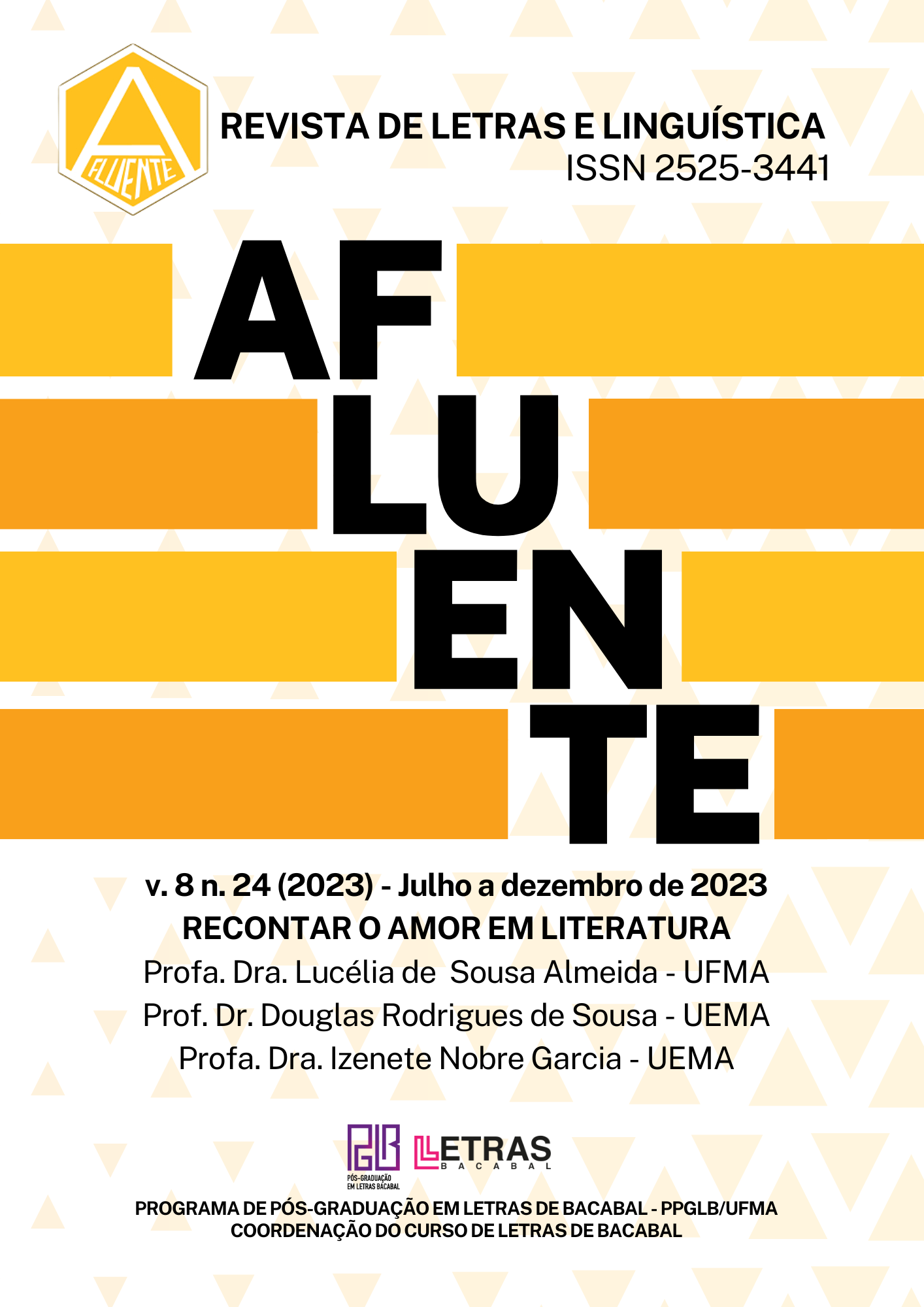I already told you goodbye, and now, how do i forget you? analysis of the romance “Copo Vazio”, by Natalia Timerman
DOI:
https://doi.org/10.18764/2525-3441v8n24.2023.45Keywords:
Copo vazio, Love, GhostingAbstract
In hypermodern times, the idea of love is understood as a constant search for emotional exchanges, loving and being loved, and when there is no reciprocity the subject feels frustrated and disillusioned due to the feeling of rejection. This article proposes to investigate the contemporary novel by Brazilian author and psychoanalyst Natalia Timerman, “Copo vazio” (2021) linked to the emotional issues of abandonment, whose practice is called ghosting. Our theoretical foundation is based on Bauman (2004), Geruza (2010), Fisher (2015), Pinto (2017) and Silva and Barbosa (2016) who discuss emotions, feelings and the theory of love. Therefore, we adopted a qualitative and bibliographic descriptive methodology as a methodology in accordance with Gil (2002). The analysis shows us that the novel “Copo vazio”, Natalia Timerman fictionally projects how we are affected by the emotion of love, therefore, it was possible to interpret the panorama of the practice of abandonment and its consequences based on the lived experience and the feelings used in the character's speeches main, and we understand that ghosting is an unparalleled emotional irresponsibility.
Downloads
References
BAUMAN, Z. Apaixonar-se e desapaixonar-se. In Amor líquido: sobre as fragilidades dos laços humanos (pp. 15-55). Rio de Janeiro: Zahar, 2004, p. 15-55.
D’AMICO, A. Ghosting: o que é como lidar essa pessoa. [Vídeo]. YouTube. <https://www.youtube.com/watch?v=1_FQc6dGCUo> 5 de mar. de 2021.
FISHER, H. A química do amor: examinando o cérebro “apaixonado”. In.: Por que amamos: a natureza e a química do amor romântico. Rio de Janeiro: Record, 2015, p 75-104.
GERUZA, S. Amor romântico: isto existe? Do mito à realidade pós-moderna. São Paulo: Fonte Editorial, 2010.
GIL, A. C. Como elaborar projetos de pesquisa. Rio de Janeiro: Atlas, 2002.
HADDAD, G. Emoções: amor. Rio de Janeiro: Duetto Editorial, 2010.
NOGUERA, R. Um mergulho no amor. In.: Por que amamos: o que os mitos e a filosofia têm a dizer sobre o amor. Rio de Janeiro: Harper Collins Brasil, 2020, p. 10-11.
PINTO, F. G. O instinto de amar. In.: Neurociência do amor. São Paulo: Planeta, 2017, p. 31-50.
RAIMUNDI, A. C. Isso tem nome: saiba o que é ghosting, quando uma pessoa com a qual você está envolvido desaparece. [vídeo]. Fantástico. <https://g1.globo.com/fantastico/noticia/2022/06/20/responsabilidade-afetiva-nao-quer-dizer-que-voce-tem-que-ter-uma-reciprocidade-do-afeto-diz-especialista-sobre-ghosting.ghtml?authuser=0 > 19 de jun. de 2022.
SECCHES, F. Copo Vazio: uma conversa com a psiquiatra e escritora Natália Timerman. Uol. São Paulo, 29 de jan. de 2021. Disponível em: <https://revistacult.uol.com.br/home/natalia-timerman-copo-vazio/> .
SILVA, F. V.; BARBOSA, M. do S. M. F. (2015). Até que o ghosting os separe: a produção de subjetividade em discursos sobre o amor virtual. Calidoscópio, 14(2), p. 265 -275. <https://revistas.unisinos.br/index.php/calidoscopio/article/view/cld.2016.142.09/5564> .
TIMERMAN, N. Copo vazio. São Paulo: Todavia, 2021.
Downloads
Published
How to Cite
Issue
Section
License
Copyright (c) 2024 Afluente: Revista de Letras e Linguística

This work is licensed under a Creative Commons Attribution 4.0 International License.
Direitos autorais Afluente: Revista Eletrônica de Letras e Linguística
Este trabalho está licenciado com uma Licença Creative Commons - Atribuição 4.0 Internacional.















